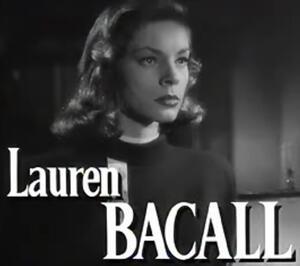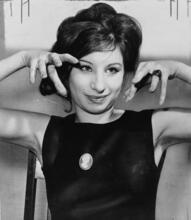Lauren Bacall
Lauren Bacall smoldered on-screen with what became known as her signature “look,” shining in her roles both alone and opposite her husband. Bacall made her debut To Have and Have Not in 1944 with Humphrey Bogart, whom she married the following year. The couple acted together in several movies, including The Big Sleep and Key Largo, and Bacall acted solo in movies like How to Marry a Millionaire and Designing Woman. After Bogart died in 1957, Bacall left Hollywood for Broadway, earning Tony Awards for Applause in 1970 and Woman of the Year in 1981. She also won a National Book Award for her autobiography By Myself in 1979, a lifetime achievement award at the Stockholm Film Festival, and an honorary Oscar in 2009.
Lauren Bacall’s 1944 Hollywood debut in To Have and Have Not catapulted this young Jewish actress into instant stardom. Costarring with her husband-to-be, Humphrey Bogart, Bacall soon became known for “The Look”—downturned head, eyes looking up, suggestive of a young woman sexually wise beyond her years. She and Bogart were one of Hollywood’s most famous couples, both on-screen and off, and Bacall was famous for her characterizations of women whose strong will complemented, rather than detracted from, their sexual attraction. Throughout her career in Hollywood, Bacall felt economic and social pressure to relinquish her Jewish identity, a demand complicated by her strong allegiance to her first-generation Jewish immigrant family.
Early Life and Family
Lauren Bacall was born Betty Joan Perske on September 16, 1924, to William Perske and Romanian-born Natalie (Weinstein) Perske. She spent her earliest years in Brooklyn. When she was six years old, her parents divorced, and she and her mother relocated to Manhattan. At age eight, her father stopped his weekly visits, and they remained estranged for the rest of his life. As an only child, Bacall was brought up in the close-knit, extended Weinstein family. In addition to her mother, Natalie Bacal (who changed her and her daughter’s last name to the Romanian version of Weinstein), Bacall was especially close to her grandmother Sophie, Aunt Renee, and uncles Charlie and Jack and their spouses. Her maternal grandfather, Max Weinstein, had started life in America as a pushcart peddler and quickly earned enough to buy a small candy store in the Bronx. He died at age fifty-five, but Sophie Weinstein managed the candy store successfully enough to send her sons to City College to get law degrees. Natalie Bacal worked as a secretary.
While a student at Julia Richman High School, Bacall took Saturday acting classes at the New York School of the Theater. For a year after high school, she attended the American Academy of Dramatic Arts until economic circumstances forced her to find employment. While looking for work in the theater, Bacall held jobs as a model on Seventh Avenue and as an usher on Broadway. She finally landed a few small roles, but still had to make ends meet by working as a model, this time for Harper’s Bazaar. After seeing Bacall on the cover of the magazine, Slim Hawks suggested to her producer husband, Howard, that he invite the young woman to Hollywood for a screen test. This invitation was Bacall’s big break.
Hollywood and New York
After her initial role in To Have and Have Not, having used the name Lauren Bacall, she co-starred with Bogart, whom she married in 1945, in The Big Sleep (1946), Dark Passage (1947), and Key Largo (1948). In 1949, the couple had a son, Stephen, and in 1952 a daughter, Leslie. While committed to her role as wife and mother, Bacall also found time to star in a number of movies, including Young Man with a Horn (1950), How to Marry a Millionaire (1953), and Designing Woman (1957). Humphrey Bogart died in 1957 of throat cancer.
At loose ends in Hollywood without Bogart, Bacall accepted an offer to return to her first love, the theater, in a show called Goodbye Charlie (1960). Moving back to New York, Bacall established herself as a consummate stage actress, starring in Cactus Flower (1966–1968), Applause (1970, 1972, 1973), and Woman of the Year (1981–1982). She received Tony Awards for her roles in the latter two shows. During this time she also appeared in several films, including Murder on the Orient Express (1966). She then continued on Broadway during a seven-year hiatus from film, returning in 1988 to appear in Mr. North, a film based on Thornton Wilder’s final novel, Theophilus North. In 1996 she appeared in The Mirror Has Two Faces, directed by Barbra Streisand. Most recently, Bacall co-starred with actress Nicole Kidman in Dogville (2003) and Birth (2004).
While living in New York, Bacall married the actor Jason Robards, Jr. During their marriage (which lasted from 1961 to 1969), she gave birth to her third child, Sam. Bacall won the National Book Award for her autobiography By Myself (1979). Her second book, Now, was published in 1994. In 2001 she won the lifetime achievement award at Stockholm’s annual film festival.
Struggle with Jewish Identity
Lauren Bacall was never known by moviegoers as a “Jewish actress.” Indeed, Warner Brothers’ first press release on Bacall incorrectly indicated that her family had been in the United States for several generations and implied that they were from the upper echelons of society (and therefore not Jewish). Bacall also deferred to Bogart in the decision to raise Stephen and Leslie as Episcopalians. Aware of the prejudice against Jews expressed by many people in power in Hollywood, Bacall—one of the few Jewish leading ladies of the studio system—did not loudly proclaim her roots. Yet, according to her autobiography, she always felt proud of her Jewish heritage, which was rooted primarily in her love for the Weinstein family. Her values and identity as a Jewish woman were firmly fixed by her upbringing in their midst.
Bacall died in New York City on August 12, 2014.
Selected Works by Laruen Bacall
By Myself (1979).
Now (1994).
Filmography
All I Want for Christmas (1991).
Appointment with Death (1988).
The Big Sleep (1946).
Birth (2004).
Blood Alley (1955).
Bright Leaf (1950).
Cobweb (1955).
Confidential Agent (1945).
Dark Passage (1947).
Designing Woman (1957).
Dogville (2003).
The Fan (1981).
Gift of Love (1958).
Harper (1966).
Health (1980).
How to Marry a Millionaire (1953).
Le Jour et la Nuit (1996).
Key Largo (1948).
The Mirror Has Two Faces (1995).
Misery (1990).
Mr. North (1988).
Murder on the Orient Express (1974).
My Fellow Americans (1996).
Ready to Wear (1994.
Sex and the Single Girl (1965).
The Shootist (1976).
A Star for Two (1991).
To Have and Have Not (1944).
Two Guys from Milwaukee (1946).
Woman’s World (1954).
Written on the Wind (1956).
Young Man with a Horn (1950).
Television
“Applause” (1973).
“Blithe Spirit” (1956).
“Dinner at Eight” (1990).
“A Foreign Field” (1993).
“From the Mixed Up Files of Mrs. Basil E. Frankweiler (1995).
“Lions, Tigers, Monkey and Dogs” (1979).
“A Little Piece of Sunshine” (1989).
“Perfect Gentlemen” (1977).
“Petrified Forest” (1955).
“The Portrait” (1992).
Theater
Applause (1970, 1972, 1973).
Cactus Flower (1966–1968).
Goodbye Charlie (1960).
Sweet Bird of Youth (1985, 1986).
The Visit (1995).
Woman of the Year (1981, 1982).
Wonderful Town (1977).
Bacall, Lauren. Lauren Bacall By Myself. Ballantine Books, 1980.
Hauptman, Jodi. Joseph Cornell: Stargazing in the Cinema. New Haven and London: Yale University Press, 1999.
Hyams, Joe. Bogart and Bacall: A Love Story. Philadelphia, P.A: D. McKay, 1975.
Quirk, Lawrence J. Lauren Bacall: Her Films and Career. Greenwich, CT: Citadel Press, 1986.





